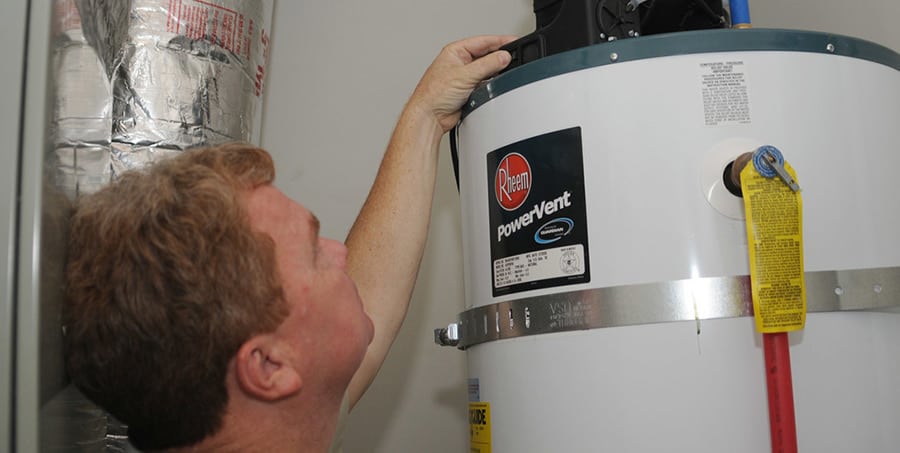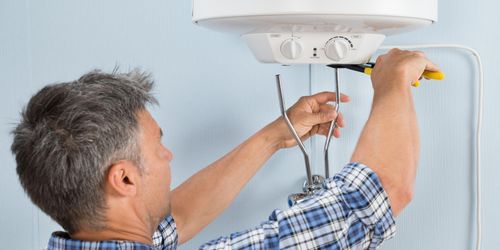Dealing with the Frequently Arising Water Heater Urgent Problems
Dealing with the Frequently Arising Water Heater Urgent Problems
Blog Article
Here in the next paragraph you can get a lot of worthwhile content around Warning Signs You Need Water Heater Repairs.

A water heater is just one of one of the most essential fundamental devices that can be found in a home. With water heaters, you don't need to undergo the anxiety of home heating water by hand every single time there is a need to take a bath, do the laundry, or the dishes. However, there is constantly an opportunity that your hot water heater would certainly break down similar to the majority of mechanical devices.
It is necessary to keep in mind any little malfunction as well as tackle it promptly before things leave hand. The majority of times, your water heater begins to malfunction when there is an accumulation of sediments as a result of continuous use. As a preventative measure, routine flushing of your water heater is recommended to prevent debris build-up and also prevent functional failure.
Common water heater emergency situations as well as just how to deal with them
Leaking water heater container.
In this scenario, you should turn off your water heating system, allow it to cool down, and very carefully look for the resource of the trouble. At times, all you require to do is to tighten up a couple of screws or pipeline links in cases of small leaks. If this doesn't work and also the leak lingers, you might require to utilize the solutions of a service technician for an appropriate replacement.
Changing water temperature.
Your water heater could start creating water of various temperature levels normally ice hot or chilly hot. In this situation, the first thing you do is to make sure that the temperature is readied to the wanted degree. If after doing this, the water temperature keeps changing during showers or various other activities, you could have a damaged thermostat. There could be a requirement to replace either the thermostat or the home heating unit of your hot water heater.
Inadequate hot water
Taking care of an inadequate supply of warm water can be discouraging. It may be that the water heater can't sustain the warm water need for your apartment. To deal with this problem, you might attempt to readjust your heating unit's temperature dial and wait on a few mins. If the issue persists, you can request for the aid of an expert plumber. You might upgrade your water heating system to one with a larger capacity.
Tarnished or smelly water
When this takes place, you need to know if the problem is from the storage tank or the water resource. If there is no funny scent when you run cool water, after that you are particular that it is your water heating system that is faulty. The smelly water can be caused by corrosion or the accumulation of bacteria or debris in the water heating system tank.
Conclusion
Some house owners overlook little caution and also minor faults in their water heater unit. This only leads to more damages as well as a feasible full breakdown of your appliance. You ought to take care of your water heater faults as soon as they come up to prevent more costs as well as unnecessary emergency difficulties.
With water heating units, you don't require to go with the anxiety of home heating water manually every time there is a need to take a bath, do the washing, or the recipes. Your water heating unit can begin creating water of different temperatures usually ice cold or hot hot. It may be that the water heating unit can't support the warm water need for your apartment or condo. If there is no funny smell when you run cool water, after that you are certain that it is your water heater that is damaged. The stinky water can be caused by corrosion or the build-up of bacteria or debris in the water heater container.
What’s Wrong With My Water Heater?
Not Enough Hot Water
You probably encounter this problem in the shower or while washing dishes. As you run your water, you’ll notice it starting to cool down. Turning up the hot faucet may not work, or it may only heat the water for a short period. Your hot water probably comes back and works normally one or two hours after you use it up.
If you’ve never had enough hot water, your heater may be too small for your home. If you haven’t had a problem until recently, there’s probably something’s wrong with your heater’s thermostat. Try adjusting it to see if you can feel a difference. Even if the thermostat’s working, the heating element itself could have burnt out. It’s also possible that a clog has restricted water flow into or out of the heater. Luckily, none of these problems are hard to fix, as long as you call them in early.
Water is Too Hot
Unregulated water heaters can make water dangerously hot. You probably have this problem if you’ve been scalded by your hot water. It’s also a likely culprit if you have trouble getting your faucets to produce a comfortable temperature. This problem is easy to fix, but it can also be a serious health hazard if you don’t address it. If you think your water is too hot, don’t doubt yourself; look into it!
Start by finding your heater’s thermostat and mark its position with a pen. Turn the thermostat to a cooler setting. Wait a couple hours to see if the problem is solved. If it isn’t, listen for boiling in the tank and look for water that comes out of the faucet steaming. In those cases, your temperature-pressure relief valve may be malfunctioning. This is a serious problem that can be dangerous, so you should have it looked at right away.
Discolored or Smelly Water
If all your water looks rusty or smells weird, there’s probably a problem with your pipes. If only your hot water looks weird, however, your water heater is probably at fault. Hot water discoloration comes in several varieties. It could look orange or brown-ish, taste rusty, or feel grainy. It could also look yellow or green-ish and taste gross or feel slimy. Either way, it’s a sign that there’s something wrong with your water heater’s tank.
Usually, hot water discoloration means sediment has built up in your tank. Sediment is made up of hardened minerals that accumulate on the inside of the water heater’s walls. When enough sediment builds up, it causes all kinds of problems–including your discolored water. Try flushing your water heater tank to clean out built up sediment. If the water still tastes rusty, your tank’s rust-preventing anode rod may have worn out. A pro can replace an anode rod easily, but without one, your tank could rust beyond repair relatively quickly.
Leaking
Water heaters can leak from several different places, and each leak means something different. If the leak is coming from a pipe above the heater, it’s possible the tank itself hasn’t been compromised. The cold inlet, hot outlet, and T&P pipes could all leak from above. Try tightening the problematic valve. If that doesn’t work, then the valve or pipe will have to be replaced.
If the leak is coming from the bottom of the tank, it’s important to determine exactly where it is. The leak could be coming out of the drain valve or your T&P valve below the tank. You can replace those valves and preserve the tank itself. If you notice the water tank itself leaking, however, that probably means it’s corroded beyond the point-of-no-return. Leaking water heaters are a big deal, so you should get yours replaced ASAP.
https://www.punctualplumberdallas.com/blog/whats-wrong-water-heater/

We had been made aware of that editorial on Common Hot Water Heater Problems through a good friend on a different web address. Are you aware of someone else who is enthusiastic about the subject? Do not hesitate to share it. Thank you so much for taking the time to read it.
Access top-rated emergency plumbers. Report this page